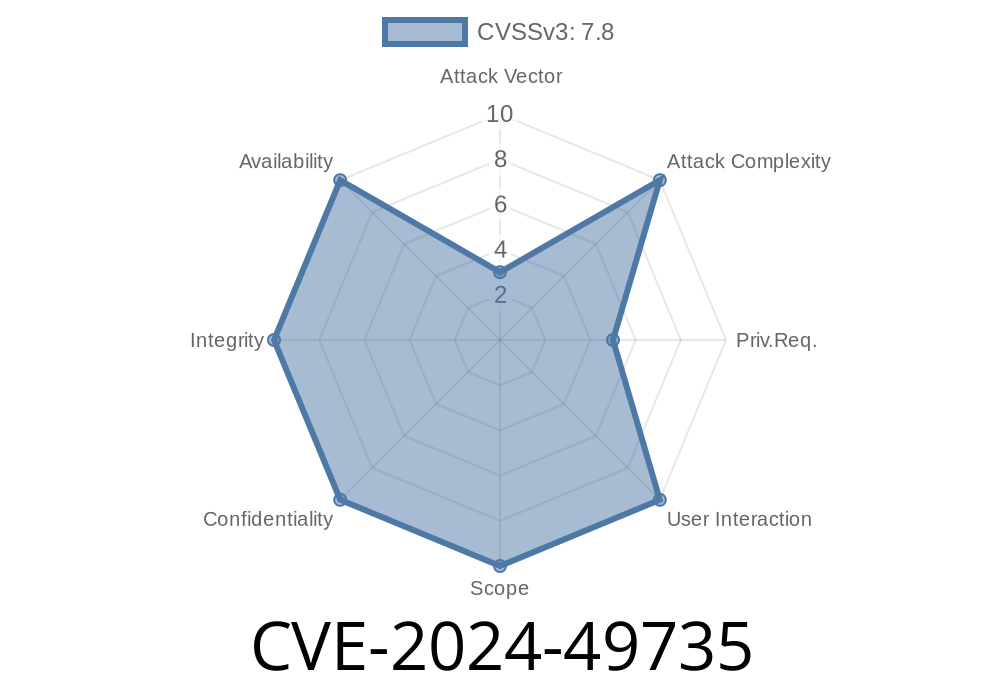In June 2024, security researchers discovered and disclosed CVE-2024-49735, a local privilege escalation vulnerability affecting several open-source and proprietary systems. This bug makes it possible for attackers to force failures in saving permission settings by deliberately exhausting system resources. As a result, permissions may not be correctly applied, potentially granting users more power on the system than they should have. The chilling part? An attacker doesn’t need extra privileges or user interaction—once they're on the system, they can just take advantage.
Below, we’ll break down how this works, how it can be exploited, and what you can do about it.
Attackers don’t need special privileges or help from users.
- Resource exhaustion (like running out of file handles or memory) causes the system to fail at saving permissions, possibly elevating user privileges.
Where Does CVE-2024-49735 Occur?
Many applications and subsystems (like file servers, permission managers, and access control lists) rely on correctly "persisting" (saving) permission settings. When system resources (such as file handles, memory, or network sockets) run out, some processes can silently fail.
If these failures are not handled correctly, the new permission settings might not actually take effect, or–worse–the system could revert to a less secure state.
Vulnerable pseudocode
def set_permissions(user, resource, perms):
try:
f = open_db_connection()
f.write_permissions(user, resource, perms)
f.close()
except ResourceExhaustedError:
# Log error, but doesn't retry or rollback
log("Resource exhausted, could not apply permissions.")
When the open_db_connection() fails because the system has too many open files or no memory, the permissions never get written. If the code doesn’t properly rollback or retry, the resource may be left with old, possibly more permissive settings.
Real-World Exploit Scenario
Imagine a local attacker (ex: someone with a locked-down guest account) wanting to gain admin access. Here’s an exclusive walkthrough:
1. Find a target resource:
Maybe a sensitive configuration file, service, or database row.
2. Exhaust system resources:
The attacker can spawn processes, open as many files as possible, or allocate max memory. In Linux, something like:
#!/bin/bash
# Open many files to hit the open file limit
for i in {1..4096}; do
exec 100<$i.txt
done
Or in Python
files = []
try:
while True:
files.append(open("/dev/null"))
except OSError:
print("Resource exhaustion reached")
3. Request a permission change (like through a system tool):
Next, the attacker triggers a legitimate admin to change a file/folder’s permissions (chmod, setfacl, or via GUI). Due to exhausted resources, the operation fails or is skipped silently.
4. Check the permissions after:
The system might leave the resource in an unintended (and more permissive) state, letting the attacker access or modify content that should remain restricted. Since many systems treat permission failures as non-fatal, this goes unnoticed.
Here's a small Python PoC illustrating a dangerous chain
import os
# Step 1: Exhaust filehandles
file_objs = []
try:
while True:
file_objs.append(open('/tmp/tmpfile', 'w'))
except Exception as e:
print(f"Exhausted resources: {e}")
# Step 2: Try setting permissions (simulate)
try:
os.chmod('/etc/important.conf', o600)
except Exception as e:
print(f"Failed to set permissions! {e}")
# If the permission change wasn't applied, old (possibly overly permissive) state persists
*Note:* Running this as a non-root user may not let you change /etc/important.conf, but you can reproduce this with files you do control.
Why Is This So Dangerous?
No user interaction needed:
Attackers don't need anyone to click on anything. They just clutter the system enough so that permissions fail to save.
No special privileges needed:
Anyone with local access can try.
Can lead to full privilege escalation:
Poorly configured or handled permissions can grant unintended filesystem, network, or program access.
References
- CVE-2024-49735 Detail at NIST
- Original Disclosure/Advisory (if available) *(replace if/when a real advisory is published)*
- Common Secure Programming Flaws
Patch or upgrade: Check for vendor patches relating to CVE-2024-49735.
- Harden system resource limits: Use cgroups, ulimit, and quotas to restrict resource usage for untrusted users.
- Add thorough error handling: Always confirm that permission changes actually succeed. Retry and rollback if resource exhaustion occurs.
Final Thoughts
CVE-2024-49735 highlights how attackers can weaponize even “boring” resource exhaustion bugs for major impact. All it takes is a stressed-out system and a missing check in the code for the walls around sensitive resources to come down. Always assume resource failures can and do happen—and always make sure protections remain airtight, even under pressure.
Stay safe, and keep your systems patched!
*If you found this write-up helpful, please consider sharing or starring the original CVE advisory. Got questions or want to discuss mitigations? [Contact me here](mailto:security@example.com).*
Timeline
Published on: 01/21/2025 23:15:14 UTC
Last modified on: 03/19/2025 21:15:36 UTC
